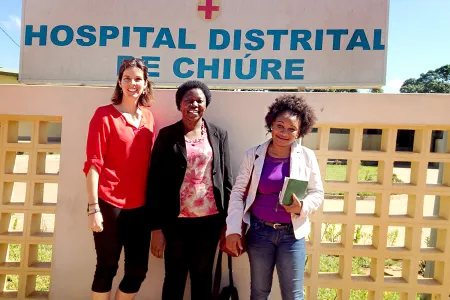News Article
Research to lower alarming global maternal mortality
Giving birth continues to be a life-threatening event for women globally, with about 830 women dying each day due to pregnancy-related complications.
Charles Darwin University PhD graduate Dr Karen Hobday set out to help lower this alarming statistic, through her research at the Menzies School of Health Research where she investigated the leading cause of maternal mortality in the country in which it is most prevalent.
“I chose to study post-partum haemorrhage (PPH) as it is a leading cause of maternal mortality around the world,” Dr Hobday said. “Women’s health is a paramount concern. If a woman dies in childbirth it has devastating consequences for the newborn, the surviving children and family members. PPH is a leading cause of Mozambique’s high maternal mortality rate.”
Dr Hobday said that while injectable oxytocin could prevent PPH, 30% of births in Mozambique occurred without a skilled birth attendant or access to oxytocin.
“Misoprostol is an alternative uterotonic in tablet form for women who are not able to travel to a health facility and birth at home without a medical professional. It can be self-administered to prevent PPH,” she said.
“The study aimed to identify facilitators and barriers influencing the scale-up of misoprostol for the prevention of PPH in two provinces of Inhambane and Nampula, Mozambique.”
In 2015, the Ministry of Health began a program to distribute misoprostol at community level in 35 districts country-wide to reduce PPH in home births. Dr Hobday partnered with the Mozambican Ministry of Health and travelled to Mozambique in 2016-2017 to evaluate the misoprostol program in two provinces.
“I visited Mozambique several times to speak with stakeholders, health staff, community health workers, traditional birth attendants involved in the misoprostol program and women who used misoprostol,” she said.
“Some of the barriers to its use included select distribution, fear of misuse, limited communication, inadequate monitoring and evaluation, and challenges with logistics systems.
“The facilitators to improve uptake included a supportive political environment; a credible and relevant innovation – in this case misoprostol to prevent PPH; a solid foundation in the health that Mozambique has worked to build; and a strong network of community health workers and traditional birth attendants.”
Dr Hobday, who experienced PPH with the birth of her first child, said her PhD was dedicated to the women globally who did not have access to the high standard of health care she received.
“Globally, PPH is one of the leading causes of maternal deaths,” she said. “If you can prevent PPH, you can potentially reduce maternal mortality by 25%, if not more.”
The findings will assist government and maternal health stakeholders to better understand factors critical to introducing misoprostol at the community level and the complexities of scaling-up.
Dr Hobday will graduate as part of CDU’s virtual graduation ceremony on Friday, June 12 with her PhD titled “Swallowing the pills: Scaling-up the use of misoprostol for the prevention of post-partum haemorrhage at home births in two provinces in Mozambique”.
Related Articles

First “hype cycle” of AI development put tech above humans
Users around the world have rushed to adopt artificial intelligence - especially in safety-critical fields - but a new study has revealed the hype has prioritised technology for technology’s sake instead of human-centred development.
Read more about First “hype cycle” of AI development put tech above humans
Nanoplastics hindering cognitive abilities of fish, international research shows
Nanoplastic exposure can impair the cognitive abilities of fish and could lead to significant impacts on marine species’ ability to survive, according to a new international study.
Read more about Nanoplastics hindering cognitive abilities of fish, international research shows
New project to grow Indigenous aquaculture on one of Australia’s largest islands
An Australian island’s efforts to improve food security and transition into a blue economy will be bolstered by a new project to propagate a nutritious and increasingly popular fish.
Read more about New project to grow Indigenous aquaculture on one of Australia’s largest islands
